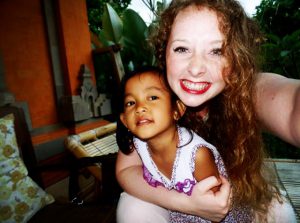The Human Ecology Model (HEM) is based on the interdependence of organisms (individuals and families) and the environmental systems with which they interact. Family is one of the most prevalent values among Thai people and the occupants of Thailand; no matter the culture or ethnicity of the person, family value has been emphasized repeatedly throughout our learning here. For this blog post I am going to focus on the socio-cultural environment aspect of the HEM, which includes the relationships, beliefs, language, laws, cultural values and norms, and the educational, political and religious systems.
The two relationships I have observed to be relevant in all of the places we’ve visited in Thailand are the relationships between parent and child, and the relationship between individual and Buddhism. Both of these relationships can be referred to as nested models, meaning that they are reciprocal, both parties are influenced by and influence each other. The relationship between parent and child is the result of the cultural belief and norm of respecting elders, and taking care of the family that took care of you. Unfortunately, people in the Hill Tribes and villages do not have superb geographical access to education, so many families send their children away to boarding schools and usually only see them on holidays about twice a year, unless the student can visit during their semester breaks or if the family can visit during the weekends. Most of the youth here play a huge role in the functioning of their family system, providing child care for their younger siblings, helping out with chores around the house or on their land, and strengthening their bond with their family while living a simple and balanced life. Once the students graduate from their higher education, they will either move into the city for better occupational opportunities and send money back to their family, or move back home and reestablish their role in the family system.
The last aspect of the socio-cultural environment is the lifestyle that the people in Thailand shape after their Buddhist beliefs. The political, educational and religious systems in Thailand have a very heavy influence from the Buddhist beliefs such as living simply, maintaining inner peace, spreading compassion and acceptance, and karma. The people we have met encompass these values and live accordingly.

